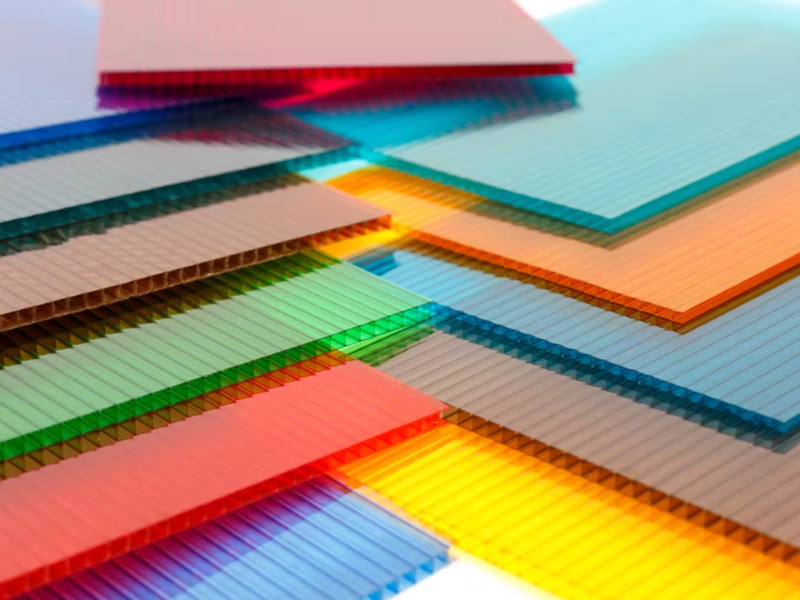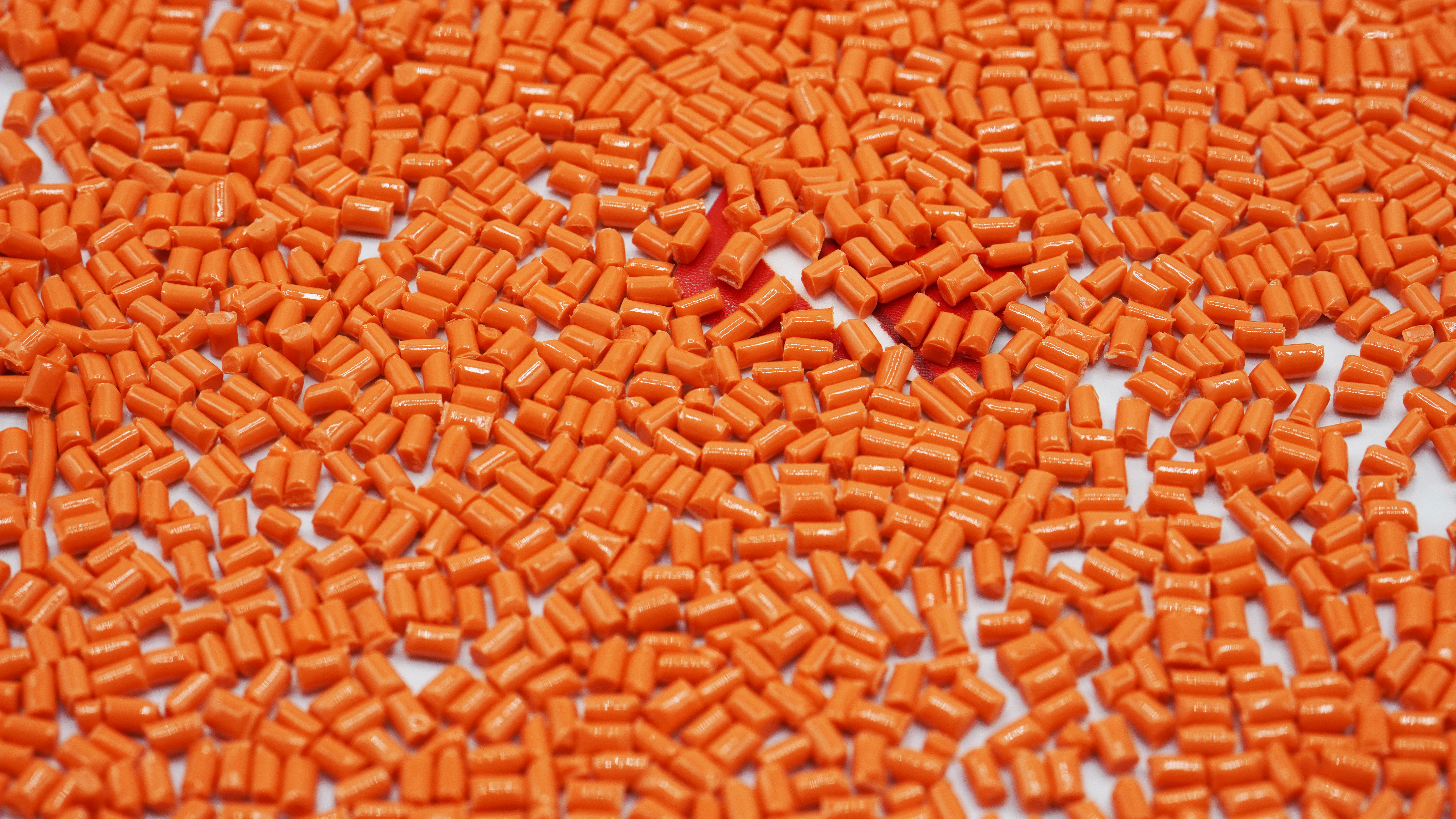Welcome to our informative guide on PC material. Polycarbonate, commonly known as PC material, is a versatile thermoplastic with numerous applications across industries. Its exceptional strength, transparency, and heat resistance make it an ideal choice for manufacturing various products. In this article, we will delve into the common applications of PC material and provide a comprehensive machining guide to help you effectively work with this versatile material. Let’s get started!
Table of Contents
- What is PC material?
- Key features of polycarbonate material
- Polycarbonate machining guide
- Polycarbonate recycling - What to note?
- PC material - common applications
- Some polycarbonate manufacturers
- PC engineering plastic compound from EuroPlas
1. What is PC material?

PC material
Polycarbonate, commonly known as PC material or PC polycarbonate, is a versatile and widely used thermoplastic polymer. When we talk about polycarbonate material, we refer to a specific type of plastic that has gained significant popularity due to its unique properties and applications in various industries.
So, what is polycarbonate material meaning? Polycarbonate material means a group of synthetic resins characterized by their transparency, high impact resistance, and exceptional thermal stability. They are derived from a class of polymers known as carbonates, which are formed through the reaction of carbonic acid with diols. The resulting polycarbonate material possesses a distinct combination of strength and clarity, making it a sought-after choice in many manufacturing processes.
Polycarbonate materials find extensive use in a wide range of applications. From consumer electronics to automotive components, medical devices to construction materials, the versatility of polycarbonate makes it suitable for diverse products. Its excellent impact resistance, optical clarity, and ability to be molded into complex shapes make it a preferred choice in industries where strength and aesthetics are paramount.
As we delve deeper into the world of polycarbonate, we will explore its various features and properties in detail. In the next section, we will discuss the specific characteristics that make PC material an exceptional choice for different applications.
2. Key features of polycarbonate material

Key features of polycarbonate material
When it comes to PC material or PC polycarbonate, its remarkable features set it apart from other materials in the plastic family. Polycarbonate materials have gained significant popularity due to their unique combination of properties, making them highly versatile and suitable for a wide range of applications.
- Strength and Durability: Polycarbonate materials exhibit exceptional strength and durability, making them highly resistant to impact and breakage. This characteristic allows products made from polycarbonate to withstand rough handling and harsh environmental conditions.
- Transparency: One of the notable features of PC polymer is their inherent transparency. Unlike many other plastics, polycarbonate maintains excellent optical clarity, allowing for clear visibility and light transmission. This property is especially valuable in applications where transparency is essential, such as windows, display panels, and optical lenses.
- Lightweight: Despite its strength and durability, polycarbonate is a lightweight material. This makes it highly advantageous in applications where weight reduction is a crucial factor, such as in the automotive and aerospace industries. The lightweight nature of PC polymer enables fuel efficiency and ease of handling.
- Heat Resistance: Polycarbonate materials possess exceptional thermal stability and can withstand a wide range of temperatures. They exhibit high heat resistance, making them suitable for applications that involve exposure to heat sources or demanding thermal conditions.
- Versatility in Processing: Polycarbonate materials are highly versatile when it comes to processing. They can be easily molded into complex shapes, allowing for intricate designs and customization options. This versatility opens up a world of possibilities for product designers and manufacturers.
- Chemical Resistance: Polycarbonate materials exhibit good resistance to various chemicals, including acids, alkalis, and solvents. This property ensures the longevity and performance of products made from polycarbonate in environments where exposure to chemicals is expected.
The key features mentioned above make polycarbonate materials an ideal choice for numerous industries and applications.
3. Polycarbonate machining guide

Polycarbonate machining
Machining polycarbonate requires careful consideration and adherence to specific guidelines to achieve optimal results. Polycarbonate materials possess unique characteristics that necessitate special attention during the machining process to ensure accurate and high-quality outcomes.
- Selection of Tools: When machining polycarbonate, it is essential to use the right tools to minimize the risk of damage or undesirable effects. Carbide or high-speed steel tools are commonly recommended for machining polycarbonate materials. These tools provide the necessary sharpness and durability to cut through the material effectively.
- Cooling and Lubrication: Cooling and lubrication are crucial factors in the machining process of polycarbonate materials. Proper cooling helps dissipate heat generated during machining, preventing the material from melting or warping. Using coolants or lubricants specifically designed for polycarbonate can enhance the cutting process and ensure smoother finishes.
- Cutting Speed and Feed Rate: Maintaining the appropriate cutting speed and feed rate is important for machining polycarbonate. High cutting speeds and feed rates may generate excessive heat and result in melting or chipping of the material. Slower speeds and feeds are generally recommended to achieve better control and precision during the machining process.
- Clamping and Fixturing: To prevent vibration or movement during machining, secure clamping and fixturing of polycarbonate materials are crucial. This ensures stability and accuracy throughout the machining operation. Proper clamping techniques, such as using soft jaws or non-marring clamps, can help avoid damage to the material's surface.
- Chip Removal: Polycarbonate machining can produce chips and swarf that need to be effectively managed to avoid interference with the cutting process. Using suitable chip removal techniques, such as using compressed air or vacuum systems, helps maintain clear visibility and prevents chips from interfering with the cutting tools.
- Finishing and Deburring: After the machining process, it is important to pay attention to finishing and deburring the machined polycarbonate surfaces. Careful removal of any burrs or sharp edges ensures a smooth and aesthetically pleasing final product. Special deburring tools or techniques can be employed to achieve clean and polished edges.
By following these guidelines and best practices for machining polycarbonate, you can optimize the process and achieve excellent results.
4. Polycarbonate recycling - What to note?

Polycarbonate recycling
Polycarbonate materials are recyclable and contribute to sustainable waste management practices. Recycling polycarbonate not only helps reduce the environmental impact but also promotes the conservation of valuable resources. If you are considering recycling polycarbonate or working with products made from recycled PC, here are some important factors to note:
- Sorting and Separation: Proper sorting and separation of polycarbonate materials are essential for effective recycling. Polycarbonate can be found in various forms, such as bottles, sheets, or electronic components. It is important to separate polycarbonate from other plastics to ensure a high-quality recycling process. Check local recycling guidelines or consult recycling facilities to understand the specific requirements for polycarbonate recycling in your area.
- Contamination and Preparation: Does dust affect PC performance? Yes, any contamination can hinder the recycling process and impact the quality of recycled PC. Before recycling, it is important to remove any contaminants, such as labels, adhesives, or non-polycarbonate materials. Thoroughly clean and prepare the polycarbonate items for recycling to ensure a cleaner and more efficient recycling process.
- Recycling Infrastructure: Ensure that there is an appropriate recycling infrastructure available for polycarbonate in your region. Not all recycling facilities may accept polycarbonate, so it is important to research and identify suitable recycling centers or programs that handle polycarbonate materials. Collaborating with local recycling initiatives or participating in specialized recycling programs can facilitate the proper disposal and recycling of polycarbonate products.
- Recycled PC Applications: Products made from recycled polycarbonate, often referred to as recycled PC, have various applications across different industries. Recycled PC can be used in the manufacturing of new products, such as automotive parts, electrical components, construction materials, and consumer goods. Consider supporting and choosing products that incorporate recycled PC to contribute to the circular economy and promote sustainable practices.
- Environmental Benefits: Recycling polycarbonate offers several environmental benefits. It helps reduce the demand for virgin raw materials, conserves energy, and reduces greenhouse gas emissions associated with the production of new PC material. By actively participating in polycarbonate recycling, you can play a role in mitigating environmental impact and supporting a more sustainable future.
By paying attention to these key points and promoting responsible polycarbonate recycling practices, we can contribute to the sustainable management of polycarbonate materials and reduce their environmental impact.
5. PC material - common applications

Common applications of PC material
PC material is a versatile polymer that finds numerous applications across various industries. Its unique properties make it suitable for a wide range of uses. Let's explore some of the common products of PC polymer:
- PC Glass: PC material is extensively used in the manufacturing of transparent panels and windows, commonly referred to as PC glass. Its excellent transparency and optical clarity make it a popular choice for glazing in architectural structures, skylights, safety goggles, and protective eyewear.
- PC Pipes: PC material is utilized in the production of pipes for various applications. PC pipes offer high impact strength and resistance to chemicals, making them suitable for plumbing systems, electrical conduits, and other fluid transportation needs.
- Polycarbonate Rod: Polycarbonate rods, made from PC material, have diverse applications in different industries. These rods are commonly used as structural support components, handles, curtain rods, and in the construction of signage. The high strength and durability of polycarbonate rods make them a reliable choice for various applications.
These are just a few examples of the many applications of PC material, including PC glass, PC pipes, and polycarbonate rods. Its versatility and unique properties make it a preferred choice in industries, such as:
- Automotive Industry: PC material is utilized in automotive components such as headlights, taillights, and interior trims. Its impact resistance and clarity ensure safety and aesthetics in vehicle design.
- Electronics and Electrical: PC material is a preferred choice for manufacturing electronic enclosures, display panels, and protective covers. Its high dielectric strength and flame retardant properties enhance the safety and functionality of electronic devices.
- Construction: PC material is used in construction applications, including skylights, roofing sheets, and safety glazing. Its durability, UV resistance, and excellent thermal insulation properties make it ideal for architectural purposes.
- Medical Equipment: PC material is commonly employed in the medical field for manufacturing devices like incubators, sterilization trays, and surgical instruments. Its biocompatibility and resistance to chemicals and heat ensure safe and reliable medical equipment.
- Consumer Goods: PC material is widely used in consumer goods such as eyewear, water bottles, and kitchen appliances. Its lightweight nature, optical clarity, and resistance to impact make it a popular choice for everyday products.
6. Some polycarbonate manufacturers
6.1. Covestro

Covestro is the leading polycarbonate manufacturer in the world, offering a comprehensive range of polycarbonate resins suitable for various applications. With a strong focus on sustainability and innovation, Covestro strives to develop polycarbonate materials that meet the evolving needs of industries such as automotive, electrical and electronics, healthcare, and construction.
Covestro's polycarbonate products are renowned for their exceptional transparency, impact resistance, thermal stability, and flame retardancy. Their extensive portfolio includes standard grades, glass-filled grades, UV-stabilized grades, and flame-retardant grades, providing options for diverse manufacturing requirements.
6.2. SABIC Plastics

SABIC Plastics, a global leader in diversified chemicals, is another major polycarbonate manufacturer. SABIC offers a wide range of polycarbonate solutions under its renowned brand, Lexan®. These materials are recognized for their outstanding mechanical properties, optical clarity, and exceptional thermal performance.
SABIC's Lexan® polycarbonate grades cater to diverse applications, including automotive components, electrical enclosures, consumer electronics, medical devices, and architectural glazing. SABIC is committed to continuous research and development, ensuring that their polycarbonate products meet stringent quality standards and deliver optimal performance.
6.3. Lotte Chemical

Lotte Chemical, a top chemical company based in South Korea, is a prominent polycarbonate manufacturer with a global presence. Lotte Chemical's polycarbonate resins are renowned for their excellent transparency, impact strength, and heat resistance, making them suitable for a wide range of applications.
Lotte Chemical offers various grades of polycarbonate tailored to meet specific customer requirements. These grades include general-purpose grades, flame-retardant grades, UV-resistant grades, and high-flow grades, enabling manufacturers to choose the most suitable material for their specific application.
6.4. Teijin Industries

Teijin Industries, a Japanese multinational conglomerate, is actively involved in the production of polycarbonate resins. Teijin's polycarbonate materials are known for their exceptional strength, high transparency, and excellent dimensional stability, making them ideal for demanding applications.
Teijin's polycarbonate product lineup includes general-purpose grades, flame-retardant grades, high-flow grades, and specialty grades designed for optical applications. These materials find applications in automotive, electrical and electronic components, optical lenses, and consumer goods, among others.

PC engineering plastic compound
EuroPlas is proud to offer our exceptional PC engineering plastic compound, meticulously designed to meet the stringent requirements of diverse industries. Our PC compound combines the outstanding properties of polycarbonate with our expertise in formulating high-performance materials. With superior mechanical strength, excellent impact resistance, and exceptional dimensional stability, our PC compound is the ideal choice for demanding applications.
At EuroPlas, we prioritize quality and precision in every stage of our manufacturing process. Our state-of-the-art facilities and advanced testing procedures ensure consistent and reliable performance of our PC engineering plastic compound. From automotive components to electrical enclosures, our PC compound delivers unmatched durability and reliability, even in challenging environments.
We understand the importance of customization, and our team of experts is ready to assist you in tailoring our PC compound to your specific requirements. With our commitment to innovation and customer satisfaction, EuroPlas is your trusted partner for top-quality PC engineering plastic compound solutions. Experience the difference with EuroPlas and elevate your products to new levels of performance and excellence.
If you are looking for top-quality PC engineering plastic compounds, contact EuroPlas today. Our experienced team will be delighted to discuss your requirements and provide you with customized solutions tailored to your specific needs.